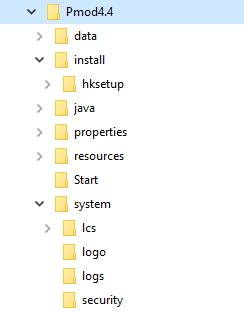The installation of the PMOD software results in directory tree containing the Java classes, configuration information, installers for the USB key driver, and example data for kinetic modeling data and image analysis.

The content of the most important sub-directories is:
data |
Container for data. DATABASES contains the tables and data of JavaDB databases, for instance of the example Demo database. |
doc |
Directory containing the PMOD html documentation as well as the pdf application guides. |
install hksetup |
Contains the driver installation files for the USB protection key. Each operating system has a dedicated sub-directory. |
java |
The ext sub-directory contains external Java libraries which support specific functions accessed from within PMOD. The jre sub-directory contains the Java Runtime Environment for running the PMOD applications. |
properties |
Contains the configuration of PMOD and the different tools. |
system |
system/lcs: license file pstarter.lcs. |
Start |
The PMOD start scripts are located here. They are generated during the installation and take into account the installation directory and the operating system. Therefore, they can not simply be copied to another system or moved to a different directory. ▪RunPmod: starts the interactive PMOD environment. ▪RunDbSvr: starts the transaction server for publishing a database called DbSvr. Default port of the transaction server is 5100. Please edit the script for using a different port. ▪RunDcmSvr: starts the DICOM server for receiving DICOM images and saving them into the DbSvr database. Default port of the DICOM server is 5030. ▪RunLcsSvr: starts the transaction server for license serving only. This is only relevant if a network license file is contained in system/lcs. |